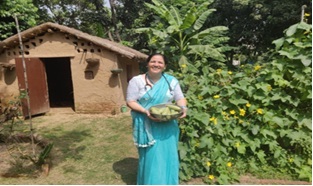POSHAN Abhiyan 2020 and its two themes: “Track the severely malnourished children and develop Nutri-gardens to promote dietary diversity”

Chandigarh / 22 September / New Super Bharat News
POSHAN Abhiyan, launched in March 2018 has been the flagship programme of the government of India to address the problem of malnutrition in India. This year too we are celebrating the third POSHAN Maah in the month of September using digital platforms due to COVID-19 pandemic to sensitize the community about various aspects of nutrition. As per the National Family Health Survey (NFHS) 4, India has high prevalence of malnutrition – underweight (36%) stunting (38%), and wasting (21%) among under-5 children in India which has evidence of socio-economic gradient. There is clear evidence that due to intake of non-nutritious, non-balanced food, India is facing under-nutrition on the one hand and obesity on the other. One of the important causes of high malnutrition rates in our children is inadequate dietary habits. Quality of diet as defined by dietary diversity is a measure of food consumption that reflects access to a variety of foods and is also a proxy for nutrient adequacy of diet of any child or adult. Dietary choices depend upon many biological, environmental and social reasons.
Food consumed by children the day before can be classified into the following seven food groups according to WHO guidance: (1) cereals, roots and tubers; (2) legumes and nuts; (3) milk and its derivatives; (4) meat products (meat, poultry, offal, and fish); (5) eggs; (6) vitamin A-rich fruits and vegetables (leafy green vegetables, yellow fruits and vegetables); and (7) other fruits and vegetables. The dietary diversity score (DDS) is defined as the number of food groups consumed by the child the previous day. A DDS of four is considered the minimum DDS. Accordingly, a child with a DDS < 4 was classified as having low dietary diversity; otherwise, he was considered to have adequate dietary diversity. The 2015-16 NFHS indicates that only twenty percent of breastfed children are offered adequately diverse diet after 6 months of age, while only 31 percent had been fed the minimum number of times appropriate for their age. These data indicate the urgent need to optimize feeding practices especially during the 1000 days of life. To achieve the global nutrition targets, concerted efforts are required to scale up various nutrition-specific and nutrition-sensitive interventions using inter- sectoral approach at the policy, health-system and community levels.
‘Nutri-gardens’ also known as ‘Poshan vaatika’ in Anganwadi centers are expected to increase dietary diversity and thereby promote healthy balanced diet. Fruits and vegetables from the nutri-gardens are good source of micronutrients. Various studies have shown that school gardens too have been shown to improve nutrition and food preference in children. They are known to bring about behavior change, reduce sedentary behaviors, enhance food security and nutritional status of the households. Nutri-gardens are known to be affordable, effective and sustainable micro-solution for ensuring healthy food and balanced nutrition. Kitchen gardening presents an innovative solution to ensure food security, employment of youth, and can be alternative way to generate extra income in country like India for improving consumption of nutritious food.

In India, several studies from villages of Odisha and Maharashtra have found positive outcomes in terms of improved dietary diversity by promoting nutrition gardens. The benefits spill over to the neighboring households as well fulfilling the nutritional requirement of the families. In addition, this year govt has launched another unique initiative of forming database of diverse indigenous food items and traditional recipes of high nutritive value and seeks voluntary participation of people of India.
The Government of India has appealed to promote Jan Bhagidari to make the POSHAN Abhiyan a super success. (Contribute towards Bharatiya Poshan Krish Kosh by sharing traditional recipes of your family / region https://innovate.mygov.in/poshanrecipe #POSHAHMaah2020 #Local4Poshan). The recent emphasis on promoting time tested, highly nutritious, cost effective and traditional home-based recipes is indeed a laudable step. Given the annual POSHAN Abhiyan targets for reducing stunting, under-nutrition, low birth weight by 2% per annum and anaemia (among young children, women and adolescent girls) by 3% per annum, it is time to act now.



